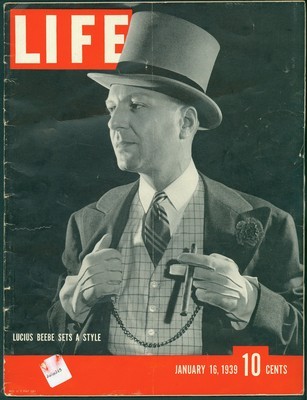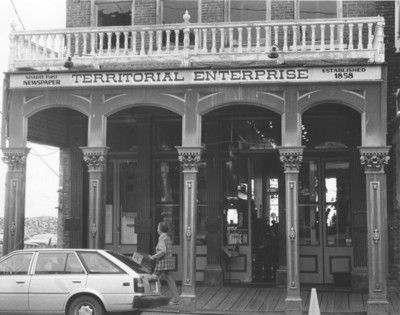ELEGANT ENTERPRISE
VIRGINIA CITY
This once splendid 19th century city had lost most of its luster when former New York Herald Tribune columnist Lucius Beebe relaunched the Territorial Enterprise newspaper in 1952.
Paid circulation of the first issue in the town of 400 was reported as 250. By the time he and partner Charles Clegg sold the newspaper in 1961, they claimed 5,000 readers from every state and 30 countries.
Beebe (1902-1966) was no ordinary small town publisher. His newspaper did carry the menu from the local elementary school, but it also poked fun at the nouveau riche gaming metropolis of Las Vegas, railed that Nevada remain "One Sound State" with no sales taxes, and ridiculed the TV show "Bonanza" for its phony portrayal of Virginia City.
The Territorial Enterprise had been Samuel Clemens' newspaper, famed because in 1863 he filed a story from Carson City first using the name "Mark Twain."
Beebe intended to return the Territorial Enterprise to its former glory. And for a time, he did, while transforming the city.
"Virginia City became the center of the universe for writers and artists," said Andrea Daily Taylor, who once lived in Beebe's Virginia City mansion.
Saul Bellow, A.J. Liebling, Cole Porter and Salvador Dali ventured to the old mining town that Beebe and Clegg put back on the cultural map, Taylor said.
Beebe came to Virginia City as one of the best known columnists in the country.
His "This New York" column in the Herald Tribune was a breezy account of his chit-chatting, eating and drinking with cafe society celebrities until dawn at the Stork and other Manhattan hot spots.
In fact, Beebe may have been the first to mention in print "Bloody Marys." He credited entertainer George Jessel with inventing the hangover recovery drink.
More than a gossip columnist, Beebe was a celebrity himself.
A dapper 6-foot-4 gentleman, he was referred to as a "bon vivant," a person of refined taste who loved good food, clothes and drinks.
He contributed articles to gourmand and history magazines, co-authored about 30 books, many on the history of railroads, and dressed in such sartorial splendor that Life magazine featured him on the cover of its Jan. 16, 1939, issue.
The accompanying story discussed how American men were "vying with girls in colorful apparel," and carried photos of gentlemen in Florida in tight swimming trunks.
Beebe and Clegg, another privileged son of a wealthy Eastern family, were gay at a time when it paid to keep that fact a secret.
"The word 'gay' wasn't used back then," said state Senate Majority Leader Bill Raggio, who remembers the pair as conscientious newspaper owners.
Even in his 60s, Beebe modeled for magazine advertisements with his Rolls Royce and Bentley.
Throughout his life, he was referred to as America's No. 1 expert in male fashions and frequently was pictured in his latest suits in wire photos that appeared in newspapers.
Newspaper rival Walter Winchell was jealous of Beebe's dashing looks and inherited wealth.
Winchell referred to Beebe as "Lucious Lucius," which could be taken as a reference to Beebe's closeted homosexuality.
Beebe had flair.
"All I wanted is the best of everything, and there's very little of that left," he once said.
It was said Beebe never would use a common word when he could find a fancier one.
In the midst of the Depression, when "Brother can you spare a dime?" was a familiar refrain, he opined that a civilized man had to spend at least $100 a day on food.
The closet in his Virginia City mansion contained more than 40 suits. He and Clegg never went on an assignment unless they were dressed at their best.
"They always dressed perfectly," remembers Joe Curtis, a lifelong Virginia City resident who operates the local Mark Twain Bookstore.
"They never wore T-shirts or sweat pants, even when they went to the post office. One always wore striped pants. They were flamboyant."
Curtis was 10 or 12 when Beebe and Clegg were in their Virginia City heyday.
What he remembers most was "T-Bone Towser," their friendly Saint Bernard that regularly wandered downtown.
Not until he became an adult did Curtis become aware that Beebe and Clegg were homosexuals.
"I just saw two guys in business who lived together. I guess that was a clue."
State Historical Preservation Officer Ron James said Beebe and Clegg never displayed affection in public, but everyone knew of their sexual orientation and tolerated it in silence.
"They had two things going for them. They spent a tremendous amount of money, and the old Western ethic of leaving people alone was in place then."
Curtis regularly receives requests for their books, which he sells for $50 to $100 each.
He also has copies of their May 2, 1952, first edition of the Territorial Enterprise.
"They saw themselves as continuing Mark Twain's newspaper. Their paper was top notch," Curtis said.
The Las Vegas Sands was a regular advertiser, as were many San Francisco and New Orleans restaurants.
Beebe and Clegg railed against Hank Greenspun over his feuds with Sen. Patrick McCarran, but the Las Vegas Sun also advertised in the Territorial Enterprise.
The pair even bought and restored two old Virginia & Truckee Railroad cars, the Virginia City and Gold Coast, and traveled like two princes during the golden age of railroads.
James conjectures the duo may have been the inspiration for "The Wild Wild West," the 1960s TV show about two dandy detectives who travel in a private railroad car.
Like Mark Twain, the Territorial Enterprise writer, Beebe played loose with the facts in his writing, state Archivist Guy Rocha said.
"He wrote with a flourish, but a lot of it was puffery," Rocha said. "He never let the facts get in the way of a good story."
Pulitzer Prize-winning journalist Warren Lerude agrees.
"A lot of what they did was satire," said Lerude, now a journalism professor at the University of Nevada, Reno. "They were full of themselves, but it was show biz. I think they were having a hell of a good time."
He remembers former Reno Evening-Gazette editor John Sanford telling him about the time Beebe showed up late for the annual convention of the Nevada Press Association.
Before his arrival, Sanford, then the association's president, closed the bar.
Beebe fumed, rapped his cane and demanded a martini.
Sanford refused him. So Beebe went to another casino and ordered a bucket of champagne delivered to every table at the press gathering -- except for the head table where Sanford sat.
Perhaps that explains why Beebe still has not been elected to the Nevada Press Association's Hall of Fame, where less prominent journalism luminaries, including Sanford, are enshrined.
Daily Taylor said Beebe and Clegg tired of Virginia City by the time "Bonanza" hit the small screen in the late 1950s and the town attracted swarms of tourists looking for the fictional Ben, Hoss and Little Joe. The Territorial Enterprise survived another eight years, and continues to publish occasionally.
Beebe became a columnist for the San Francisco Chronicle. He and Clegg settled in the expensive Bay Area suburb of Hillsborough. Bing Crosby and his family were neighbors.
Clegg, nearly 13 years Beebe's junior, died in 1979 at 63, the same age as Beebe when he died in 1966.
Beebe left almost all of his $2 million estate, including the mansions in Virginia City and Hillsborough, to Clegg.
Time magazine reported Beebe left $15,000 in his will for T-Bone Towser II, the 5-year-old son of the Saint Bernard that roamed Virginia City.
Clegg said Towser needed the money because of the expensive habits he picked up from his master.
"He does love pâté de foie gras and caviar," Clegg said. "He drools terribly if you serve either one."
Contact reporter Ed Vogel at evogel @reviewjournal.com or (775) 687-3901.


















